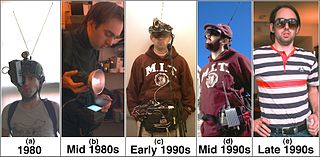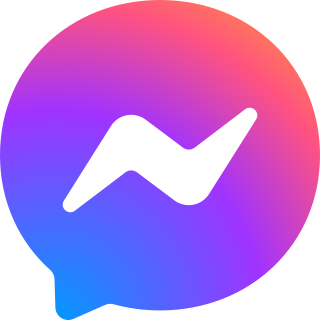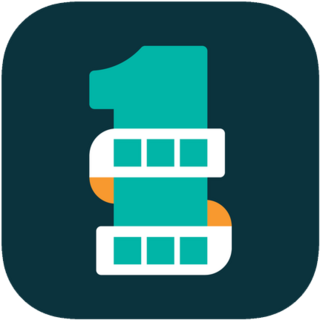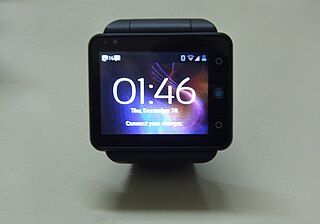
A lifelog is a personal record of one's daily life in a varying amount of detail, for a variety of purposes. The record contains a comprehensive dataset of a human's activities. The data could be used to increase knowledge about how people live their lives. In recent years, some lifelog data has been automatically captured by wearable technology or mobile devices. People who keep lifelogs about themselves are known as lifeloggers.

A smartwatch is a wearable computer in the form of a watch; modern smartwatches provide a local touchscreen interface for daily use, while an associated smartphone app provides management and telemetry, such as long-term biomonitoring. While early models could perform basic tasks, such as calculations, digital time telling, translations, and game-playing, smartwatches released since 2015 have more general functionality closer to smartphones, including mobile apps, a mobile operating system and WiFi/Bluetooth connectivity. Some smartwatches function as portable media players, with FM radio and playback of digital audio and video files via a Bluetooth headset. Some models, called watch phones, have mobile cellular functionality such as making telephone calls.

Pinterest is an American image sharing and social media service designed to enable saving and discovery of information like recipes, home, style, motivation, and inspiration on the internet using images and, on a smaller scale, animated GIFs and videos, in the form of pinboards. The site was created by Ben Silbermann, Paul Sciarra, and Evan Sharp and it is operated by now Pinterest, Inc., and headquartered in San Francisco.
Looxcie was a mobile-connected, handsfree, streaming video camera created by Looxcie, Inc., a privately owned Sunnyvale, California company. The Looxcie video camera was named a top 50 best invention of 2010 by Time Magazine, and LooxcieLive, their live streaming video service, was named as a top 100 best innovation of 2011 by Popular Science.

Messenger is an American proprietary instant messaging app and platform developed by Meta Platforms. Originally developed as Facebook Chat in 2008, the company revamped its messaging service in 2010, released standalone iOS and Android apps in 2011, and released standalone Facebook Portal hardware for Messenger calling in 2018. In April 2015, Facebook launched a dedicated website interface, Messenger.com, and separated the messaging functionality from the main Facebook app, allowing users to use the web interface or download one of the standalone apps. In April 2020, Facebook released a Messenger desktop app for Windows and macOS.

Lockitron is a device which can lock and unlock doors via remote control, typically via a smartphone. Starting with installations in 2010, it is one of the earliest examples of a Smart lock. Lockitron was made by Apigy Inc., a start-up based in Mountain View, California. Apigy was a graduate of the Y Combinator start-up accelerator.

Lumia imaging apps are imaging applications by Microsoft Mobile and formerly by Nokia for Lumia devices built on the technology of Scalado. The Lumia imaging applications were notably all branded with "Nokia" in front of their names, but after Microsoft acquired Nokia's devices and services business the Nokia branding was superseded with "Lumia", and often updates included nothing but name changes, but for the Lumia Camera this included a new wide range of feature additions. Most of the imaging applications are developed by the Microsoft Lund division. As part of the release of Windows 10 Mobile and the integration of Lumia imaging features into the Windows Camera and Microsoft Photos applications some of these applications stopped working in October 2015.

Autographer is a hands-free, wearable digital camera developed by OMG Life. The camera uses five different sensors to determine when to automatically take photos and can take up to 2,000 pictures a day. It was released in July 2013 and is used primarily for lifelogging, entertainment and travel. As of 16 October 2016, OMG Life, the company behind Autographer discontinued operations.
Skully was a brand of motorcycle helmet with a heads-up display and a rear-facing camera.

Newton is an email management application for iOS, Android, MacOS, Windows and ChromeOS developed by CloudMagic, Inc. The application is known for its searching capabilities, cross-platform abilities and user interface. It has been referred to as an email client better than Gmail's native app. As from September 15, 2016, CloudMagic has been renamed to Newton Mail with premium services, adding a host of new features and functions.

23snaps Ltd. is a free, private social network and photo sharing service for families that allows parents to save photos, videos, measurements and stories of their children to a digital journal and privately share those updates with other family members or close friends. 23snaps is available online and on mobile devices and launched 1 June 2012.

1 Second Everyday (1SE) is an application developed by Cesar Kuriyama. The application allows the user to record one second of video every day and then chronologically edits (mashes) them together into a single film. It is compatible with iOS and Android. The idea of the application was developed by Kuriyama's 1 Second Everyday — Age 30 video.

The Neptune Pine is an unlocked GSM standalone, full featured smartwatch developed by Canadian consumer electronics and wearable technology company Neptune. It was announced in January 2013 by Simon Tian and launched in November 2013 on Kickstarter. Within 27 hours, the campaign had reached its funding goal of $100,000, and ultimately went on to raise more than $800,000 in 30 days, becoming the highest-funded Canadian Kickstarter campaign at the time.
Looksery is an American software and photography company founded in 2013 by Victor Shaburov and Yurii Monastyrshin. The company is based in San Francisco and owned by Snap Inc. The company developed the Looksery application that does facial modification of photos in real time on mobile platforms.

Daydream is a discontinued virtual reality (VR) platform which was developed by Google, primarily for use with a headset into which a smartphone is inserted. It is available for select phones running the Android mobile operating system that meet the platform's software and hardware requirements. Daydream was announced at the Google I/O developer conference in May 2016, and the first headset, the Daydream View, was released on November 10, 2016. To use the platform, users place their phone into the back of a headset, run Daydream-compatible mobile apps, and view content through the viewer's lenses.

Instant is a Quantified Self mobile app for iOS and Android. It tracks the user's phone/app usage, travel, places, fitness and sleep automatically. It puts all this information on a dashboard and gives the user analysed reports based on the data. It is developed by Emberify, founded by Shashwat Pradhan. Instant 4.0 was launched on 13 July 2016 with a Chatbot Coach. The Coach allows users to query data and it also passively analyses the user's trends and correlations.
HUDWAY is a California-based company that provides head-up displays. The company was founded in 2013 by cousins Ivan Klabukov and Alex Ostanin.

VSCO, formerly known as VSCO Cam, is a photography mobile app for iOS and Android devices. The app was created by Joel Flory and Greg Lutze. The VSCO app allows users to capture photos in the app and edit them, using preset filters and editing tools.
Hello was an American technology company that sold sleep tracking devices and a sleep tracking application to help monitor sleep. The company was founded in August 2012 and shut down in June 2017.













